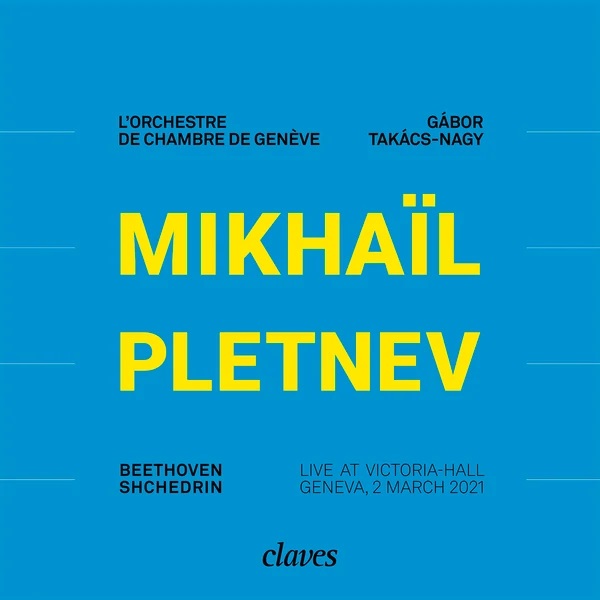Ein durch Corona-Infektionen dezimiertes Orchester, eine bedrückende Atmosphäre: die Aufnahme von Beethovens Drittem Klavierkonzert ist seltsam, zurückhaltend in Tempi und Expressivität. Die Musik fließt wie gehemmt, fast erzwungen und mit vielen Imponderablen einer Liveeinspielung, die das doch störende Schnaufen, ‘Singen’ und Stampfen des Dirigenten mit eingefangen hat. Pletnev spielt wie absorbiert und ohne jeglichen Enthusiasmus. Das Orchester bleibt lethargisch und wacht erst in Rodion Shchedrins Carmen-Suite auf. Diese Ballett-Suite ist ein nach Bizet arrangiertes Werk für Streicher, Pauken und vier Schlagzeuggruppen. Shchedrin wollte damit erklärtermaßen so weit wie möglich von Bizet weg!
Im Gegensatz zu Pletnevs Einspielung dieses Stücks, gelingt Takacs-Nagy eine recht gute Interpretation mit jener Portion Humor, die in Pletnevs Dirigat mit dem Russischen Nationalorchester völlig fehlte. Diese Aufführung aus Genf ist effektvoll und hat Pep. Wenn Takacs-Nagy nur nicht immer dazu singen würde! Und nicht stampfen!
Die Tonaufnahme ist räumlich, aber höchst unausgewogen. Etliche Mikrophone stehen so nah an den Pulten, dass man jede Unsauberkeit sowie diverse Geräusche hört. In anderen Worten: der Klang ist hier extrem trocken, dort hallig, hier scharf und klar, dort mulmig und basslastig. Eine schlechtere Mischung wäre wohl kaum möglich gewesen.
Unter dem Strich finde ich nur ein Wort um diese Aufnahme zu charakterisieren: skurril.
An orchestra decimated by Corona infections, and consequently a rather oppressive atmosphere: the recording of Beethoven’s Third Piano Concerto is strange, restrained in tempi and expressivity. The music flows as if inhibited, almost forced, and with the many imponderables of a live recording that has captured the conductor’s nevertheless distracting puffing, ‘singing’ and stomping. Pletnev plays as if absorbed and without any enthusiasm. The orchestra remains lethargic, waking up only in Rodion Shchedrin’s Carmen Suite. This ballet suite is a work arranged after Bizet for strings, timpani and four percussion sections. Shchedrin avowedly wanted to get as far away from Bizet as possible with this one!
In contrast to Pletnev’s recording of this piece, Takacs-Nagy manages a quite good interpretation with that dose of humor that was completely absent from Pletnev’s conducting with the Russian National Orchestra.
This performance from Geneva is effective and alert. If only Takacs-Nagy didn’t always sing along with it! And not stomp!
The sound recording is spacious, but highly unbalanced. Quite a few microphones are so close to the music stands that one hears every impurity as well as various noises. In other words, the sound varies from extremely dry to reverberant, from sharp and clear to muffled and rumbling. A worse mix would hardly have been possible.
So I find only one word to characterize this recording: bizarre.


















